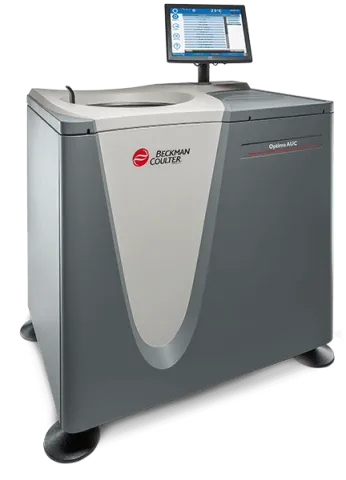
.
Category
- Biocharacterization » Biochemistry
Booking Details
Facility Management Team and Location
Facility Features, Working Principle and Specifications
Facility Description
Beckman Coulter Optima AUC is a tool that provides data used to determine protein molecular weight in basic protein research and quantification of aggregation levels for academic and biopharma research.
Sedimentation of solute particle makes heavier particles to sink and lighter particles to float. If the solution is subjected to high angular velocity, the effect of gravity and thereby the rate of sedimentation greatly increases due to application of external force which is centrifugal force. In analytical ultracentrifuge this redistribution of the particles is monitored using absorbance or interference optical system. This rate of redistribution is used to get the sedimentation coefficients which ca further help to get hydrodynamic properties of the molecular species in the solution.
- Speed range: 1,000 — 60,000 RPM
Speed control — Actual measured rotor speed, ± 2 RPM at steady state (1,000 RPM to rated speed), It should have option for Braking speed.
- Time
Set time: — Up to 1000 hrs ( approx.), including Hold runs.
Time display indicates time remaining and time elapsed in method scan.
Time accuracy ± 50 ppm (5 seconds/day) or similar
- Temperature
Set temperature: 4 to 40°C in 1°C increments
Temperature display: Actual rotor temperature in 0.1°C increments
Ambient temperature range: 10 to 30°C
- Scanning UV/VIS Absorbance Optical System
It should have 10 μJM Xenon Flash Absorbance optics or equivalent
Wavelength range – 180 to 800 nm (precision: ± 0.5 nm)
Photometric display range – 0 to 3 absorption Units
Usable concentration range – 0 .005 - ~50 mg/mL
Wavelength scan mode — wavelength increment step size 1.0 nm, from 190 nm to 800 nm
- Interference Optical System
Rayleigh interference detection
Usable concentration range 0.01 to 20mg/mL
Wavelength – 660 nm
Laser - Red laser 120 mW Diode
Scan Rate - approximately every 5 seconds
Interferometer precision - approximately ± 0.008 fringe
- Analytical Rotors
An-50 Ti Maximum speed up to 50000 RPM and up to 7 samples and a counterbalance can be run at one time.
An-60 Ti Maximum speed up to 60000 RPM and up to 3 samples and a counterbalance can be run at one time.
- Analytical cell, torque stand, counterbalance kit, accessory kit, and cell housing kit.
Instructions for Registration, Sample Preparation, User Instructions and Precautionary Measures
Charges for Analytical Services in Different Categories
Please send an email to ashutoshk@iitb.ac.in for the charges.
Applications
AUC technology can help to provide answers to critical questions about biomolecules. It can give information about following properties:
- Shape: How spherical is my protein?
- Diameter: What’s the size of my particle?
- Mass: What’s the molecular weight of my protein or complex in solution?
- Stoichiometry: How many subunits comprise my protein?
- Purity: Are there other particles in my sample?
- Formulation: How does my protein behave in this buffer?
- Heterogeneity: Is my protein bound to other molecules, and what’s the configuration of the complex?
- Aggregation: Is my protein still in a usable form? Should I expect an immune response with my drug formulation?
- Association: Does my protein associate and/or dissociate with other proteins?
- Conformation: Does the conformation of my protein change upon binding to a ligand?
